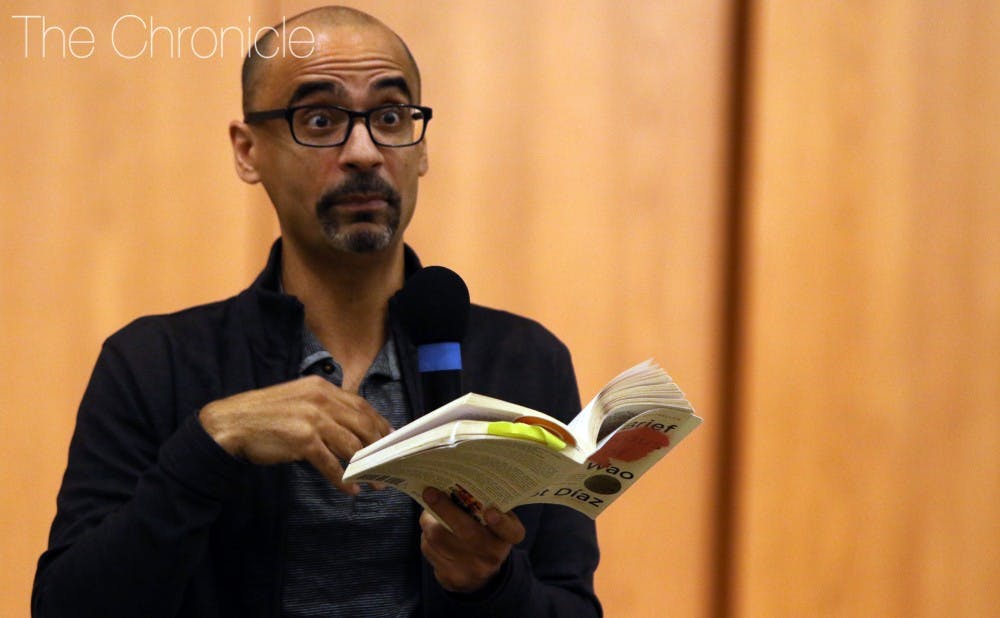Junot Díaz often doesn’t enjoy writing. In fact, he avoids writing whenever possible and wishes that he wasn’t born with such a strong talent in fiction. This statement may sound strange coming from such a highly acclaimed author, but Díaz offers an explanation.
“I probably would be a better writer if I liked life less,” Díaz said. “I only write when I absolutely have to. We are often called to things that don’t give us pleasure. But you can only avoid it so much before you’re called to do it.”
The Junot Díaz reading and Q&A event Monday, Oct. 17 was filled with such unexpected, and often humorous, comments. On the humorous side, Díaz called Duke students “nerds” and mentioned that during his own time in college, his work ethic was “straight savage” while he managed school work and a full time job.
When he asked for a show of hands of all the people from the Dominican Republic in the room and only a couple people raised theirs, he said,“Duke, what’s up with your recruitment?”
Comedy aside, Díaz provided valuable insights for creative writers and the Duke community as a whole. For example, he reminded the writers in the room that, “If the writer’s hand weighs too heavily on the reader, it no longer feels like collaboration.”
He also discussed the importance of immersing oneself in the world and living if you want to be a strong writer. To Díaz, art is about “one’s relationship with the world,” and without these experiences, Díaz believes it’s challenging to write well.
Díaz had a particularly interesting response to a question regarding methods for ensuring that creative writing is original.
“Why would anyone want to be original?” he said. “That sounds like an enormous burden. I wouldn’t worry about being original. The writer isn’t the one who decides what is good. Why are you trying to [take] the role of the reader? I have no idea whether [my work] is good. I just worry about giving my absolute all.”
In addition to providing writing advice, Díaz spoke about his dedication to “fight[ing] the fight for people of color” and other minorities. After being born in the Dominican Republic and then moving to New Jersey, Díaz is passionate about issues such as racism and biases against immigrants, and he seeks to change systems that oppress these minorities.
Díaz is the author of three novels, including “Drown,” “The Brief Wondrous Life of Oscar Wao” and “This Is How You Lose Her.” His books have garnered a number of prestigious literary awards, including the 2008 Pulitzer Prize in fiction, the National Book Critics Circle Award, a spot on the New York Times bestseller list and being a National Book Award finalist. In addition, Díaz is a professor at the Massachusetts Institute of Technology, as well as fiction editor for the Boston Review.
The Junot Díaz event was part of the Blackburn Visiting Fiction Author series, a program started nearly 30 years ago in honor of William Blackburn, who was a prominent creative writing and Duke English professor during the mid-20th century. The program brings in renowned fiction and poetry writers from across the nation and world for public readings and to host workshops for creative writing students. Previous speakers include Lydia Davis, Zadie Smith, John Ashbery, Ha Jin, Gish Jen and others.
Joe Ashby Porter, Duke professor of advanced workshop in the writing of fiction, selects authors for the Blackburn Visiting Fiction Author series in conjunction with the Creative Writing Committee, of which he was Chair for 20 years. According to Porter, the Creative Writing Committee’s goal of bringing in authors is two-fold.
"We, as the Creative Writing Committee, take it as part of our charge to help satisfy the public’s appetite for direct, personal contact with writers. The second reason we bring visiting writers in is so that … students in writing courses can be inspired by actual living, distinguished creative writers,” Porter commented.
For the past six years, Porter had hoped that Díaz would come to speak at Duke, as he fell in love with Díaz’ work after reading the first few sentences of one of his pieces.
“His fiction read to me, then and still does, like a breath of fresh air in the world of contemporary fiction for a number of reasons, including what I would call the politics of his fiction, particularly what I would call his feminism,” Porter said. “What I [also] like is the language he uses. It’s a kind of English I had not seen anybody else use. In particular, one of the dimensions of his language is his ease in using multiple registers of the English language, essentially at the same time. He can go from street-wise, slangy English to sophisticated, philosophical, abstraction [and] from English to easy, contemporary Spanish.”
The Díaz reading was one of the most popular Blackburn Visiting Fiction Author events ever. Originally, the event was scheduled to be held in the Nelson Music Room but was moved to the Geneen Auditorium due to high demand, and roughly 400 spots were filled with members of the Duke and Durham community who were also fortunate to participate in a book-signing after the event.
Get The Chronicle straight to your inbox
Signup for our weekly newsletter. Cancel at any time.

